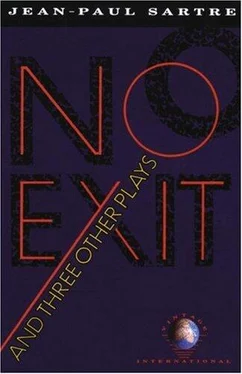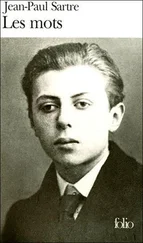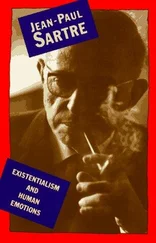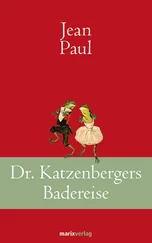Jean-Paul Sartre - No Exit
Здесь есть возможность читать онлайн «Jean-Paul Sartre - No Exit» весь текст электронной книги совершенно бесплатно (целиком полную версию без сокращений). В некоторых случаях можно слушать аудио, скачать через торрент в формате fb2 и присутствует краткое содержание. Жанр: Философия, на английском языке. Описание произведения, (предисловие) а так же отзывы посетителей доступны на портале библиотеки ЛибКат.
- Название:No Exit
- Автор:
- Жанр:
- Год:неизвестен
- ISBN:нет данных
- Рейтинг книги:3 / 5. Голосов: 1
-
Избранное:Добавить в избранное
- Отзывы:
-
Ваша оценка:
No Exit: краткое содержание, описание и аннотация
Предлагаем к чтению аннотацию, описание, краткое содержание или предисловие (зависит от того, что написал сам автор книги «No Exit»). Если вы не нашли необходимую информацию о книге — напишите в комментариях, мы постараемся отыскать её.
This play, an example of expert craftmanship so organized that the audience learns very slowly the facts concerning the three characters, is Sartre's indictment of the social comedy and the false role that each man plays in it. The most famous utterance in the play, made by Garcin, when he says that hell is other people, l'enfer, c'est les autres, is, in the briefest form possible, Sartre's definition of man's fundamental sin. When the picture a man has of himself is provided by those who see him, in the distorted image of himself that they give back to him, he has rejected what the philosopher has called reality. He has, moreover, rejected the possibility of projecting himself into his future and existing in the fullest sense. In social situations we play a part that is not ourself. If we passively become that part, we are thereby avoiding the important decisions and choices by which personality should be formed.
After confessing her sins to Garcin, Inès acknowledges her evil and concludes with a statement as significant as Garcin's definition of hell. She needs the suffering of others in order to exist. (Moi, je suis méchante: ça veut dire que j'ai besoin de la souffrance des autres pour exister…) The game a man plays in society, in being such and such a character, is pernicious in that he becomes caught in it. L'homme s'englue is a favorite expression of Sartre. The viscosity (viscosité) of such a social character is the strong metaphor by which Sartre depicts this capital sin and which will end by making it impossible for man to choose himself, to invent himself freely. The drawing-room scene in hell, where there is no executioner because each character tortures the other two, has the eeriness of a Gothic tale, the frustration of sexuality, the pedagogy of existentialist morality. The least guilty of the three seems to be Garcin, and he suffers the most under the relentless intellectualizing and even philosophizing of Inès. At the end of the play, Garcin complains of dying too early. He did not have time to make his own acts. (Je suis mort trop tôt. On ne m'a pas laissé le temps de faire mes actes.) Inès counters this (she has an answer to everything, Garcin is going to say) with the full Sartrean proclamation: "You are nothing else but your life." (Tu n'es rien d'autre que ta vie…)
No further argument seems possible after this sentence, and the play ends three pages later when the full knowledge of their fate enters the consciousness of the three characters and Garcin speaks the curtain line: Eh bien, continuous… ("Well, well, let's get on with it…"). This ultimate line which, paradoxically, announces the continuation of the same play, was to be echoed ten years later in the concluding line of Samuel Beckett's Waiting for Godot. The two plays bear many resemblances both structurally and philosophically.












